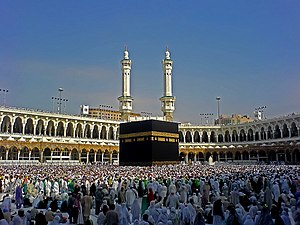My last ‘review’ was very badly done. Let’s hope this is a bit better.
Part 2 of the series deals with several hugely significant events. I don’t say I understand them but it is what Muslims believe. Rageh is unashamedly open about the fact he is a Muslim and I respect that. He is seen at prayer and he’s obviously wide-eyed at where he finds himself and from his perspective probably feels a great sense of privilege.
This program has Robert Spencer on a bit more than Part 1 so the program is trying to address the difficulties and differences found within Islam. It’s not a complete whitewash. But again it is – I think – a charm offensive. For your info Robert Spencer has a blog called Jihad watch.
The first significant event I’ll consider is where Mohammed flees to Medina (originally named Yathrib). So significant an event that it’s from this date that Muslims begin their calendar. His native tribe is after him for preaching one God, the Quraysh relying on trade resulting from the worship of many Gods at the Kaaba in Mecca. His journey (Hijra)to Medina broke the ties of customary loyalty to tribalism and therefore the new religion of Islam, to put it in 21st century language, became global. It was no longer tied to a local community but was open to all. The people at Medina – not without some problems – pretty much all converted to Islam with Mohammed as their prophet.
Significance of Hijra
I may have missed it but the significance of this event for today and for non-Muslims was not discussed. Here’s why. Sam Solomon (converted ex-Muslim Jurist) & E Al Maqdisi have written a book (2008) called ‘Al-Hijra: The Islamic Doctrine of Immigration’. This doctrine has a terrible relevance given the massacre in Norway. But it is an Islamic doctrine nonetheless. Mohammed’s original migration is used as a model today for how – to put no finer point on it – to take over non-Muslim societies. A couple of quotations from their book sets the context.
The Hijra was enshrined by Muhammed from the outset within Islam as the ‘Doctrine of Immigration’, or the ‘peaceful’ means of extending the Islamic political state garbed and girded in religious terminology. Hijra and military conquest are two components of Islamic expansion.
So today as we see staggering numbers of immigrants from Muslim countries in Europe and in the Americas, with developing Muslim communities that are self-segregating and asking for more and more rights and privileges to the point of the recent adoption of Shariah Family Law in the United Kingdom – we have to ask questions as in the title of this book, “Are these communities wanting to join the free societies? Or, are they extending the ‘Abode of Islam’ as per the ‘Doctrine of Immigration’ which was modelled by Muhammad in the initial Hijra?”
I think we can see why the Al-Hijra doctrine was not mentioned. In the program Karen Armstrong said Mohammed was not just a ‘spiritual genius’ but also a political genius of the ‘highest order’.
The Night-time Journey
The second significant event to consider is Mohammed’s ‘night-time journey’. This event involved an apparent – and here there is disagreement within Islam – instantaneous journey to Jerusalem. Some Muslims believe it was spiritual and physical, others that it was purely spiritual (theological), that is Mohammed never actually went to Jerusalem. Whether physical or not it’s significance is massive. Mohammed arrives at Jerusalem and is taken up into heaven and spoken to by of Allah where he meets all the previous prophets Abraham, Moses etc including Jesus and leads them all in prayer. This is, so Muslims believe, confirmation and acceptance that Mohammed is the last of the prophets. And, that Islam is linked to both Judaism and Christianity. I need to just point out here that the Bible very clearly says in the book of Hebrews Chapter 1 (New Testament):
Heb 1:1 Long ago, at many times and in many ways, God spoke to our fathers by the prophets,
Heb 1:2 but in these last days he has spoken to us by his Son, whom he appointed the heir of all things, through whom also he created the world.
Heb 1:3 He is the radiance of the glory of God and the exact imprint of his nature, and he upholds the universe by the word of his power. After making purification for sins, he sat down at the right hand of the Majesty on high,
Heb 1:4 having become as much superior to angels as the name he has inherited is more excellent than theirs.
The significance of this journey to Jerusalem is seen regularly on the TV news channels. What’s all the trouble about in the Middle East. Here it is. Jerusalem as far as Muslims are concerned belongs to them. So there can never ever be peace, until Jerusalem and I’m assuming all Israel is either wiped off the face of the earth or becomes an Islamic State in practice not just in theory. I hope I have understood this correctly – please tell me if this is not so. This is heady stuff.
I intended on looking at the various massacres. I’ll leave it at this and deal with it in a separate post – Part 2A.
Related articles
- The Life of Muhammad, BBC Two, review (telegraph.co.uk)



 Rageh Omaar will be presenting for the
Rageh Omaar will be presenting for the